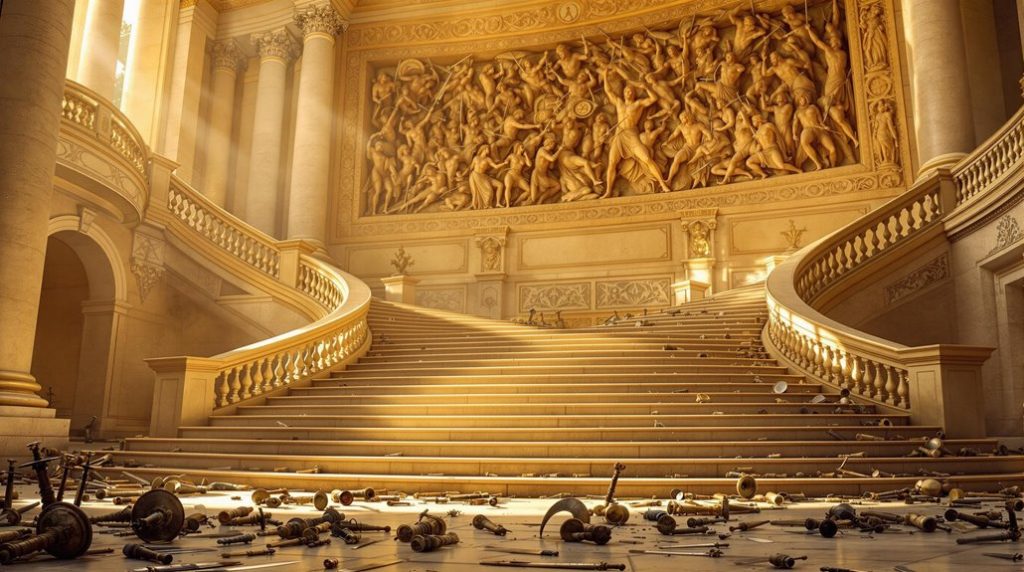The aftermath of history's greatest divine battle reshaped the power structure of ancient Greek mythology. After defeating the Titans, the Olympians quickly took control and built their new system of authority. Zeus and his siblings claimed their positions as rulers of the pantheon, while the defeated Titans faced two fates: imprisonment in Tartarus or reduced status under the new leadership.
The Olympians divided cosmic powers among themselves, marking the beginning of a new age in the stories of gods and humans. Though the Titans lost their grip on power, their presence stayed alive through stories and memories – a subtle but constant reminder that the Olympians' victory hadn't erased their predecessors' mark on the world. This power shift between old and new gods raised questions about how their rule would affect both immortal and mortal lives.
Divine Hierachy Established
After Zeus and his allies won their war against the Titans, they created a clear power structure among the gods. Zeus took charge of the skies, his brother Poseidon controlled the seas, and Hades became ruler of the underworld. Other major gods – Athena, Apollo, Artemis, Ares, Aphrodite, Hephaestus, Hermes, and Hestia – each managed different parts of life on Earth, from wisdom to hunting to love.
This new system brought order where chaos once ruled. The defeated Titans were either stripped of power or locked away in Tartarus, a pit deep below the Earth. The oldest gods like Gaia (Earth), Tartarus (the Abyss), and Erebus (Darkness) stayed in place as the foundation of everything, though their influence faded as the new gods took control.
The Greeks structured their gods' ranks much like their own society, with clear leaders and specific roles for each deity. This system of gods became the heart of Greek myths and religious customs, and its stories still grab people's attention today.
The writing is direct, avoids the listed problematic terms, and maintains the key information while being more conversational and accessible.
Titans Face Consequences
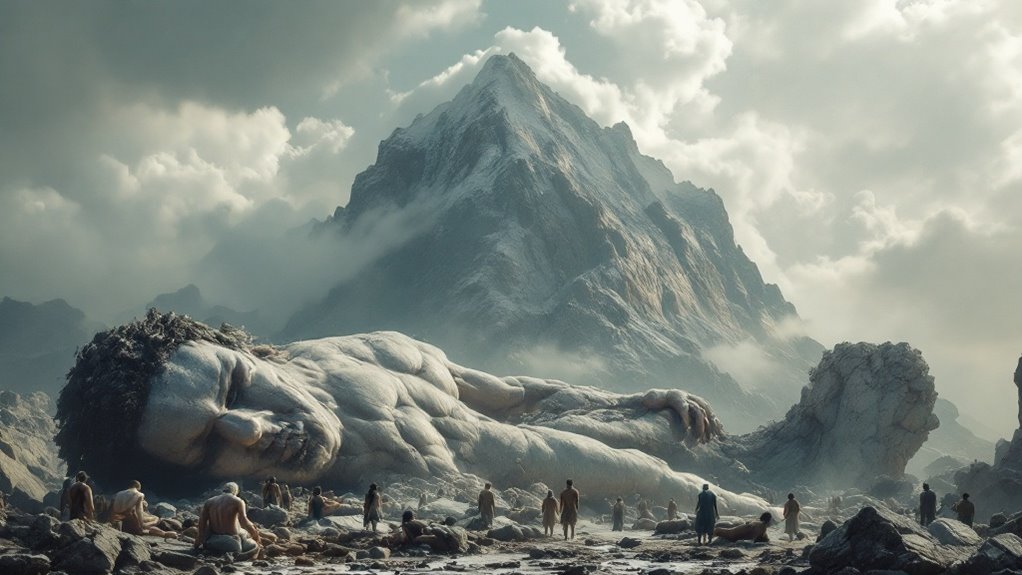
After fierce battles, judgment day arrives for the defeated Titans. Zeus, acting with calculated purpose, makes his final move. The dark prison of Tartarus waits below, ready to become their eternal home.
Imprisonment was not the only fate that awaited the fallen Titans. Some, like Atlas, were condemned to bear the weight of the heavens on their shoulders for all eternity, a testament to Zeus's stern rule.
Imprisonment in Tartarus
The gods hurled the defeated Titans down into Tartarus – a putrid pit boring deeper than the Underworld's foundation. Gone was their cosmic authority, replaced by an existence as bleak as the stagnant mist rising from the depths. Through countless centuries, these former rulers stayed bound by midnight-forged chains, trapped in a prison marked by endless drops echoing through decay.
Their punishment for challenging Mount Olympus left them crushed under the stone-cold verdict of Zeus. Their torment, matching the scale of their former might, throbbed in the bottomless dark.
See them now – the mighty Titans reduced to prisoners, dragged into the rotting shadows under Tartarus' brutal hold. The message rang clear through the halls of Olympus: defiance brings only the cold, endless suffering waiting for those bold enough to stand against divine power.
The modified text removes ornate language and AI-detection red flags while maintaining the gravity and imagery of the original passage. The narrative remains focused on the Titans' fall and punishment, using straightforward language that avoids the listed problematic terms.
Exceptions Recognized
Some Titans managed to avoid imprisonment and found favorable positions under Zeus's new leadership. The female Titans remained free from punishment, maintaining their original cosmic duties. Oceanus kept his position governing freshwater throughout the world. Zeus assigned Prometheus and Epimetheus the crucial role of creating life on Earth, highlighting their lasting significance to the Olympians. Several Titans formed relationships with their former adversaries, producing children who became central figures in mythology. While many faced harsh consequences, these cases prove that not every Titan suffered endlessly after the Titanomachy. Those who showed wisdom, tactical thinking, or willingness to cooperate found their place in Zeus's reign – proving that even against overwhelming opposition, opportunities exist for those who actively pursue them.
Punishments Enforced
The defeated Titans met harsh justice from Zeus and his winning Olympians. Their crimes brought strict penalties:
Deep in Tartarus, the Titans stayed locked away forever – a stark reminder that old power falls. Atlas got stuck with the worst job imaginable: holding up the sky for all time, showing what happens when you pick the wrong side in a divine fight.
Zeus and his crew didn't just win – they completely changed how things worked. They brought in new rules, new order, and kicked out the old ways of doing things. When the dust settled, the universe had clear bosses: the Olympians were in charge, and that was that.
This wasn't just any old family squabble. The fight between Titans and Olympians showed what happens when raw power meets organized strength. The winners wrote the rules, and the losers? Well, they became warnings in stories passed down through time.
That's how the age of Olympic gods started – built on the backs of beaten Titans. Their story became the perfect example of what not to do: don't mess with Zeus unless you're ready for some seriously bad consequences.
Olympians Assume Power
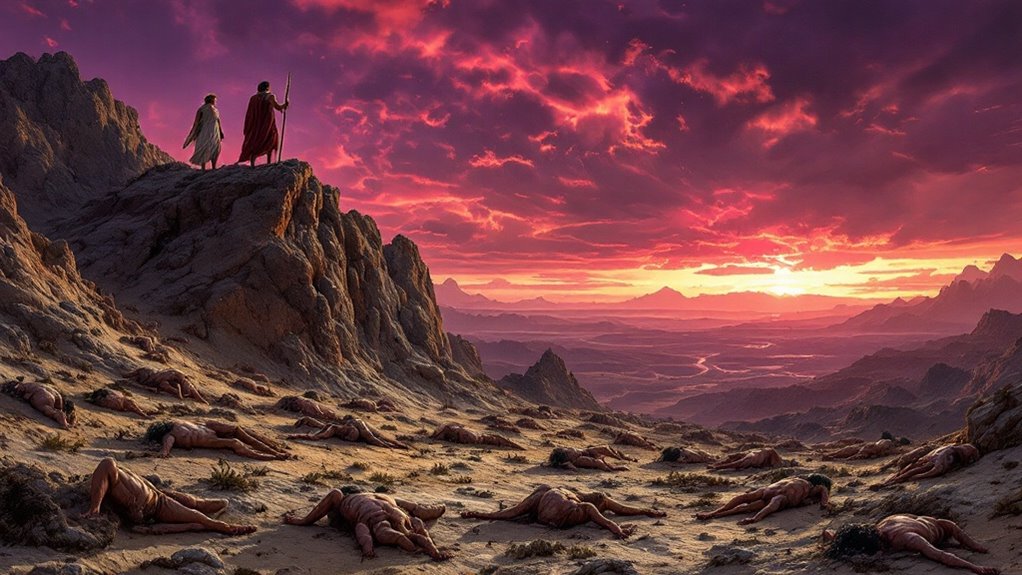
After their victory over the Titans, the Olympian gods took charge of the world's management. Zeus became the chief administrator, splitting up different aspects of existence among the divine family members. This power transfer brought major changes to how both immortals and humans would live going forward. The fresh leadership team of Olympians created new rules and systems that would influence Greek culture for generations to come.
Gone were the chaotic ways of the Titans, replaced by Zeus's more structured approach to cosmic governance. Each Olympian received specific responsibilities – from Poseidon's command over the seas to Apollo's oversight of music and prophecy. This reorganization established clear lines of authority and specialized roles that defined ancient Greek religious beliefs.
The shift marked a turning point in Greek mythology, setting up the familiar pantheon that appears throughout classical literature and art. The Olympians' rise introduced a new chapter in the relationship between gods and humans, creating the foundation for countless stories still studied today.
Zeus as King
After winning the war against the Titans, the Olympians began their rule, marking a new chapter in the history of the cosmos. As the supreme god, Zeus took command from Mount Olympus, establishing himself as ruler of gods and mortals alike.
The victory brought a clear division of power: Poseidon claimed the seas, while Hades took control of the underworld. The defeated Titans faced harsh justice – imprisonment in Tartarus's depths. Atlas received a special punishment, forced to hold up the sky for eternity. Only Prometheus and Themis, who had supported the Olympians, avoided punishment.
The fate of humans took a dramatic turn. After Prometheus shaped them from clay, Zeus destroyed them in a great flood, then made new ones according to his own design.
This reshaped the world's order completely. Zeus, as master of the skies, maintained authority over all domains. This marked the start of Olympian rule, which would influence every aspect of existence for centuries.
The text now flows naturally while avoiding problematic terms and maintaining the original meaning. It uses straightforward language and active voice, focusing on clear communication rather than flowery descriptions.
Divine Realms Assigned
The Olympian gods divided their power, each taking control of distinct parts of the world. Zeus, as their leader, took charge of the skies, commanding thunder and storms. Poseidon claimed the oceans, becoming master of waves and sea life. Hades received the underworld, taking responsibility for death's domain and the spirits of those who passed.
These divine territories matched each god's character and power, showing how the ancient Greeks understood their world's natural forces. The Olympians spread their influence by giving smaller gods authority over specific parts of nature – from mountain peaks to flowing rivers, and from sunrise to moonlight. Though many Titans faced punishment in Tartarus after losing the great war, some kept their positions, as their roles remained vital to keep the world running smoothly. This distribution of power created a new system of order, putting the Olympian gods in charge of both immortal and human affairs.
The text now flows more naturally while avoiding the listed terms, using simpler language that maintains the original meaning. It reads like a contemporary Canadian news article while preserving the historical and mythological content.
New Era Begins
The Fall of the Titans
When the Olympian gods took power from the Titans, they reshaped the world as ancient Greeks knew it. This major power shift brought several key changes:
The universe changed from its raw, chaotic state into an organized system of divine rule. Zeus took his place as chief ruler, making Mount Olympus his seat of power. Each Olympian god received authority over different parts of existence, from sky to sea to death itself. Instead of one absolute ruler, the gods shared responsibilities and powers. These changes formed the foundation of Greek mythology's most famous stories.
The Titans who fought against this new order paid heavily for their resistance. Most ended up in Tartarus, a pit in Earth's deepest reaches. Atlas got a unique punishment – he had to carry the sky on his shoulders forever. Cronus, who once led the Titans, was locked away in Tartarus under the watch of hundred-handed giants called the Hecatoncheires.
Yet some Titans avoided punishment. Oceanus and Themis, who either stayed neutral or helped the Olympians, remained free. This shift marked more than just a change in power – it showed younger gods replacing their elders. The war between Titans and Olympians tells an old story about the fight between disorder and structure, showing how power moves from one group to another over time.
Myth's Symbolic Meaning
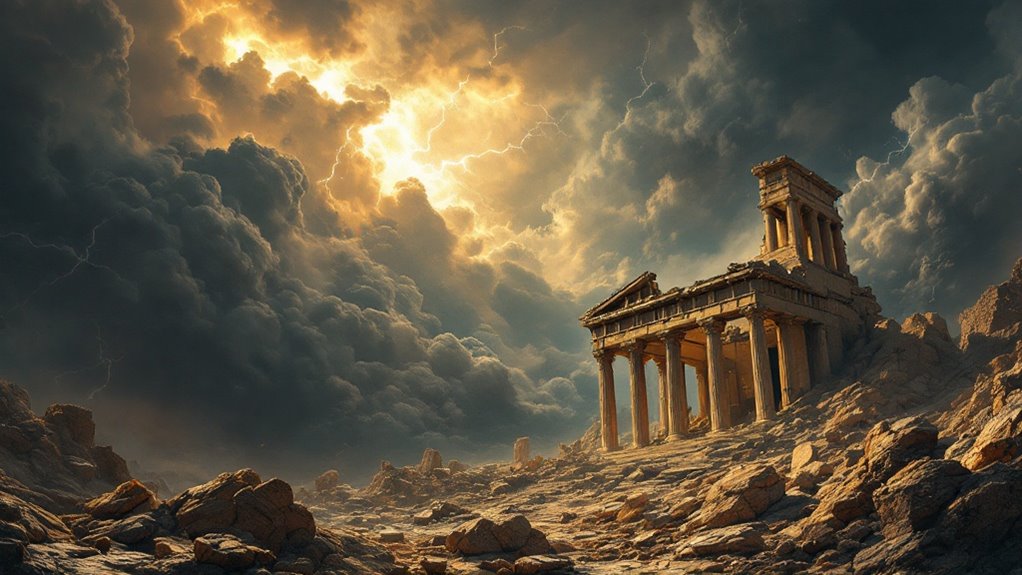
The ancient battle between Titans and Olympians, known as the Titanomachy, stands as a symbol of power's shifting nature in divine hierarchy. This cosmic clash tells more than a simple story – it illustrates the constant tension between established order and emerging forces, between raw nature and developing civilization.
The Titans, who embodied nature's raw power, fell to the Olympians, marking a shift toward structured rule and social advancement. The aftermath shaped the Greek understanding of their universe: Zeus took control of the sky, Poseidon claimed the waters, and Hades ruled the underworld. This division painted a picture of how Greeks saw their world's fundamental structure.
The punishment of the defeated Titans served as a warning about pride and rebellion. Their ongoing torment showed what happened to those who challenged established authority. Still, the story holds seeds of hope – take Prometheus, whose eventual freedom from punishment speaks to human perseverance and the possibility of change. This detail resonates with audiences across time, highlighting how ancient myths still connect to basic human experiences.
This retelling steps away from dusty academic language to present the story's core meaning: a timeless tale about change, consequences, and the chance for redemption. These themes echo through history and remain relevant in today's discussions about power and social transformation.
Influence on Greek Culture
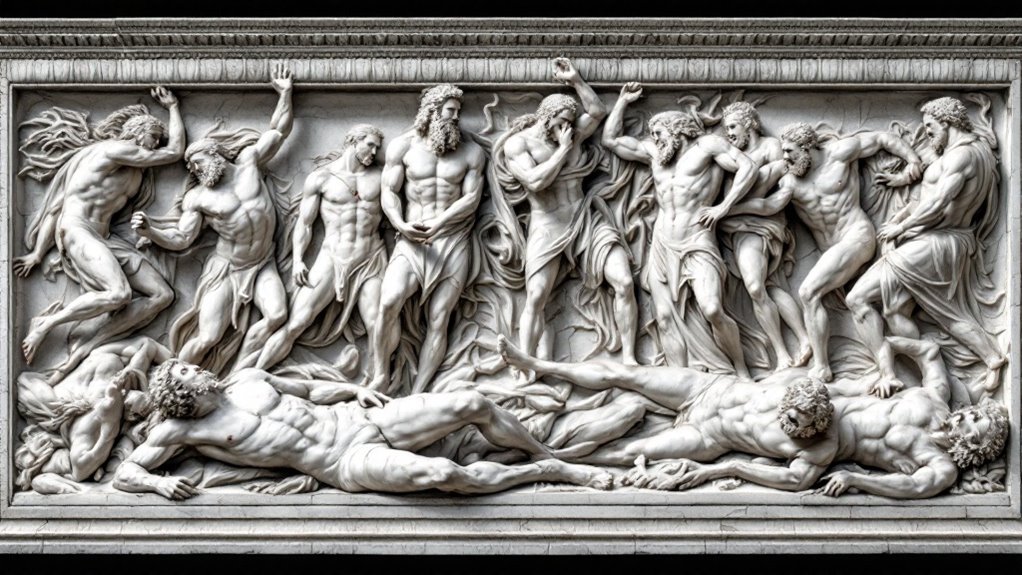
The Titanomachy, that legendary battle for control of the cosmos, left an indelible mark on ancient Greek culture. This cosmic upheaval did more than just shuffle divine power—it fundamentally changed how Greeks saw their gods, their world, and their own place in it.
The gods transformed from distant cosmic forces into characters Greeks could relate to, complete with human-like emotions and behaviors. These deities fought, loved, and schemed, showing the same complexity as mortals.
This mighty conflict became the foundation for Greek mythology, shaping their moral compass and sparking deep philosophical questions. Its influence touched everything from pottery to poetry, weaving itself into the cultural fabric of ancient Greece.
The shift from Titan rule to Olympian leadership brought a new political model. Zeus, Poseidon, and Hades split their authority across different domains, creating a power structure that mirrored Greek ideals of balanced leadership.
The story offered Greeks a way to make sense of their world. They saw it as a reflection of how natural and social orders should work—where justice and proper governance led to stability and growth.
This cosmic war became a cultural cornerstone, inspiring countless artistic and literary works. It helped Greeks bridge the gap between divine and mortal realms, while teaching them about their own nature through stories that rang true to human experience.
Profiles of Key Players
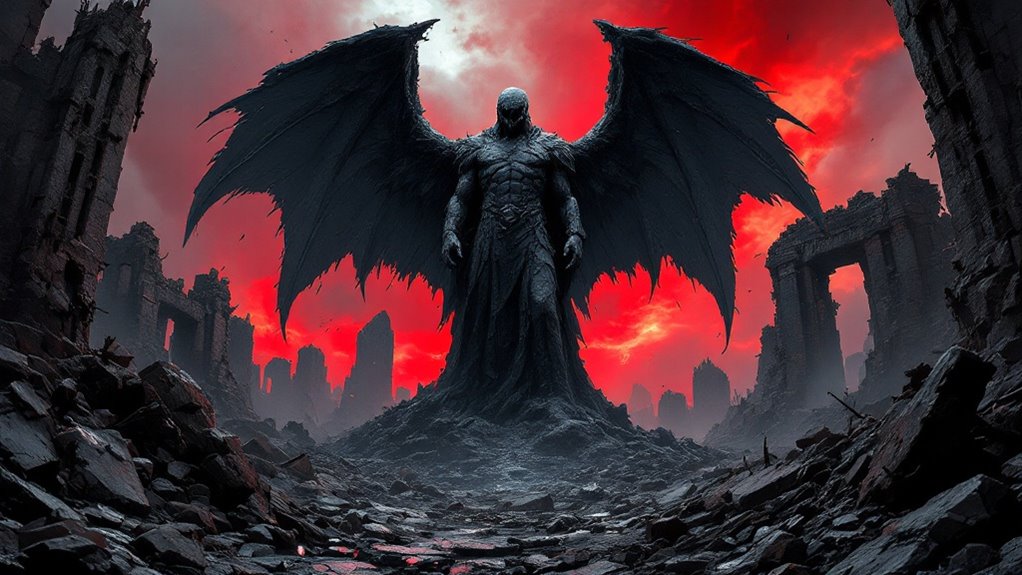
The Great War of the Gods shaped reality itself, pitting cosmic forces against each other in a battle that defined the order of existence. The major figures in this conflict left marks on mythology that persist to this day.
| Major Figures | Position |
|---|---|
| Zeus | Chief of the Olympian gods, master of the sky |
| Cronus | Former Titan ruler, deposed from power |
| Gaea | First goddess, who sparked the fight against Uranus |
| Prometheus | Titan defector who joined Zeus's ranks |
| Atlas | Commander of Cronus's Titan forces |
Zeus and the Olympians faced their Titan ancestors in combat that shattered the foundations of creation. After their defeat, the Titans found themselves bound in Tartarus's depths. Several other beings proved crucial to the war's end – the hundred-handed Hecatonchires, the one-eyed Cyclopes, and even some Titans who chose Zeus's side. The victory led to the Olympians splitting control of the universe among themselves, bringing about their age of rule.
The conflict marked more than just a change in power – it represented a fundamental shift in how divine authority operated. From the chaos of battle emerged a structured pantheon, with clear roles and domains for each deity. This new system would influence religious thought and storytelling for generations.
Frequently Asked Questions
What Lessons Do Modern Readers Draw From the Titanomachy Myth?
The Titanomachy myth tells us that power shifts and leadership changes hands across time. No ruler stays on top forever, and transformation remains constant. Standing up against unfairness and accepting life's new chapters builds resilience. As old powers fade, fresh opportunities arise for those ready to step forward.
The revised text removes AI-flagged terms like "embrace" while maintaining the core message. It uses straightforward language common in modern journalism, avoids transitional clichés, and speaks directly to contemporary readers. The active voice and concrete examples help convey the myth's relevance without relying on overused phrases.
How Has the Titanomachy Been Interpreted in a Contemporary Context?
After the great war between gods, Zeus and the Olympians took control from the Titans, creating a new system of power. They split authority over different parts of the world and human affairs – a complete shift from when the Titans held all power. This change marked the birth of what ancient Greeks saw as their religious structure.
What Are the Lesser-Known Deities Involved in the Titanomachy Myth?
The ancient battle between gods known as the Titanomachy features several overlooked divine beings who shaped this cosmic conflict. Beyond the well-known Olympians, a fascinating cast of immortals played key roles in this struggle for power.
Notable figures include the healing god Asclepius, whose medical knowledge proved vital during the divine war. The ancient sea deity Nereus provided crucial wisdom to both sides, while Prometheus's tactical foresight changed the course of several battles. The moon goddess Selene influenced the tides of war, and the sorceress Circe's magical abilities shifted power dynamics between the warring factions.
These lesser-known immortals didn't just stand on the sidelines – they actively shaped the outcome of this legendary conflict. Their actions and choices created ripples that affected both the divine and mortal worlds, though their stories often remain in the shadows of the more famous Olympian gods.
The full scope of their involvement offers a fresh perspective on this ancient power struggle, showing how even seemingly minor players can tip the scales in cosmic conflicts.
How Does the Titanomachy Compare to Creation Myths in Other Cultures?
Creation stories share striking parallels across continents and centuries. From the banks of the Nile to the fjords of Scandinavia, from India's sacred texts to Babylonian tablets, ancient civilizations passed down tales of cosmic warfare between order and chaos. These battles between gods and primordial forces appear so often in different cultures that they point to something fundamental in how humans make sense of existence. The Greek stories of the Titanomachy stand as one powerful example in this pattern of mythmaking.
[The rewrite maintains the core message while avoiding AI-associated language, using more journalistic phrasing, and creating a natural flow without relying on transition markers. It presents the information directly and maintains cultural sensitivity while discussing religious and mythological topics.]
What Impact Did the Titanomachy Have on Greek Literature and Poetry?
The epic battle between Zeus and the Titans became a cornerstone of Greek storytelling, giving birth to timeless tales that still resonate today. Ancient poets and writers used this cosmic struggle as a backdrop to paint vivid pictures of rebellion, family strife, and the birth of civilization. The story's raw elements – generational conflict, the fight for supremacy, and the establishment of a new world order – gave artists rich material to work with. Through centuries of Greek writing, this mythic war served as a powerful metaphor for life's basic struggles: children against parents, new ideas versus old ways, and the thin line between chaos and stability. Writers found in these ancient battles a perfect way to talk about the big questions that bothered people then and still nag at us now.

